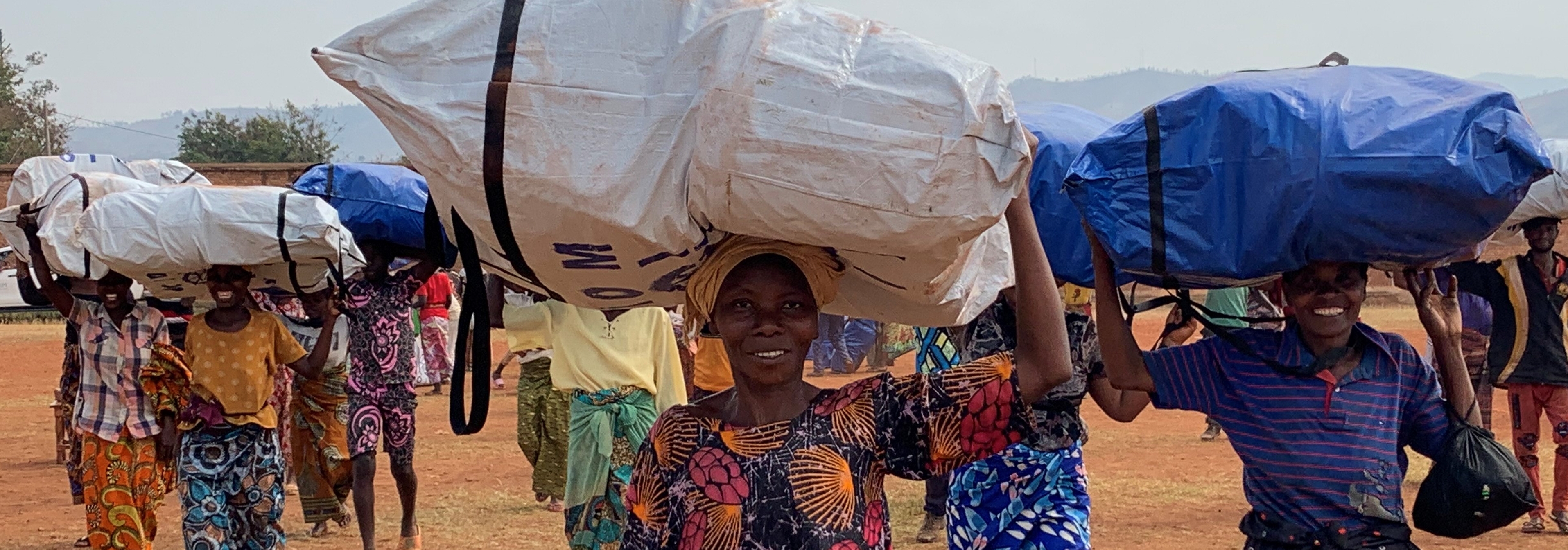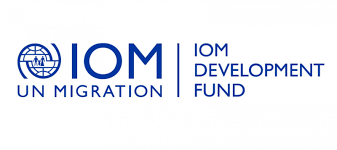IOM Vision
In partnership with the Government of the Republic of Burundi and other key actors, IOM seeks to ensure that humanitarian needs for affected populations are met, while contributing to durable solutions and peacebuilding goals, in line with the humanitarian-development-peace nexus (HDPN). Specifically, IOM works in support of displaced communities to provide a range of life-saving humanitarian assistance, primary health care, and development-orientated interventions, supporting the Government’s efforts to identify opportunities to resolve displacement situations progressively and durably. IOM further focuses on strengthening the resilience of the Burundian population in the face of future recurrent shocks, which are increasing in intensity and frequency.
Objective
Saving lives and protecting people on the move
|
|
To respond to the Shelter and Non-Food Items (SNFI) needs of communities affected by humanitarian crises in the country, IOM will provide emergency assistance to IDPs, as well as to Burundian returnees. In this regard, activities will include but are not limited to:
|
|
IOM will provide site management support to the Government of Burundi in the Bujumbura area, as well as along the southern coastal region of Rumonge. Activities will include:
|
|
IOM will support IDPs, returnees and host communities to improve safe and dignified living conditions through safe water, sanitation, and hygiene activities. IOM will aim to reduce the risk of WASH-related diseases by improving hygiene behaviours and access to WASH services in accordance with the Sphere standards through the following activities:
|
|
IOM Burundi’s protection programme (including counter-trafficking) aims to identify the most vulnerable cases and survivors of trafficking/exploitation/GBV among emergency settings, crisis-affected communities and populations (IDPs, returnees, host communities) and provide them with immediate life-saving and long-term support. In addition, IOM will be supporting the government in providing rapid emergency identification to guide direct assistance to vulnerable people (data will be shared in the National Data Toll to be used for beneficiary selection, vulnerability targeting, and programming). Activities will include:
|
|
IOM will work closely with government counterparts, civil society and key health partners to improve the MHPSS services provided to vulnerable migrants, including crisis-affected populations. IOM will encourage the implementation of activities that strengthen the peaceful coexistence and social cohesion of communities most affected by displacement, with high vulnerability and in need of direct mental health and psychosocial support. IOM will also support the country’s efforts to integrate mental health services in the Burundi health system by supporting the government. Activities will include:
|
|
IOM will collaborate with the Ministry of Public Health, specifically with the Emergency Operator Centre, to sensitize decision makers at the central and intermediate health system level on the necessity of the integration of migrant health in the existing health care provision mechanisms so migrants and mobile populations in need of health care seen at points of entry can be assisted. Burundi hosts migrants from various regions where different languages are spoken. Health care providers will be trained on how to provide migrant-centred health services to ensure the specific needs of the migrants are addressed. Health authorities will be trained on migration-sensitive approach so as migrants needs and responses are incorporated in strategic documents, including financing, policies, planning, implementation, monitoring and evaluation to insure equitable access to services that are financially and physically accessible, and acceptable to all patients – for example, non-discriminatory and responsive to their gender, cultural and linguistic needs, and are scientifically and medically appropriate. In addition, non-health personnel will be trained on their role in cross-border disease surveillance. They will not replace health personnel, but they will be capacitated to inform competent authorities whenever they see a traveller with health issues. Activities will include:
|

Objective
Driving solutions to displacement
|
Returnees, IDPs and host communities face similar hardships in terms of access to basic services and livelihood opportunities. Returnees and IDPs are particularly vulnerable in terms of access to safe shelter/housing, as well as access to land. Women and girls face specific protection risks and youth across social groups are particularly vulnerable in terms of livelihoods. In terms of capacities, women and youth have untapped potential to become key change-makers in their society but lack the opportunities and tools to participate meaningfully in decision-making processes. All social, gender and age groups have the capacity to participate in the planning, implementation and monitoring of IOM’s community-based activities, but need to be empowered to do so. Under this objective, IOM will target:
Entities targeted include local administration, informal conflict resolution mechanisms, civil society organizations, and the Ministries of Solidarity and Interior. |
|
Improved security conditions have contributed to the voluntary return of a considerable number of Burundian refugees from neighbouring countries to their communities of origin. However, most areas of return are characterized by a lack of resources and employment opportunities, which can pose a challenge to reintegration and lead to tensions between returnees and host communities. IOM will support community stabilization in areas of return through the provision of Community-Based-Planning platforms such as spaces for community-dialogues for dialogue and peaceful engagement, short-term job opportunities and livelihood support with the aim of fostering socioeconomic stability and social cohesion within communities of return. The activities will include:
|
|
The recurring natural hazards and economic hardships in Burundi are causing cycles of protracted internal displacement in the country. Affected populations require support in achieving durable solutions to displacement, whereby they no longer have any specific assistance and protection needs linked to their displacement. IOM will contribute to address the main barriers to achieving durable solutions for IDPs, in particular in terms of adequate standards of living and access to livelihoods. This will be done through a coherent development-oriented approach based on the findings from the Stability Index, including through:
|
|
The context of an ongoing economic crisis, lack of livelihood opportunities, insufficient access to basic services, migration flows, and remaining tensions from previous socio-political crises, make Burundi particularly fragile to recurring conflict and violence at the local level. To decrease the risks of outbreaks of community-level conflict and violence and to foster sustainable development, IOM will support peacebuilding and conflict prevention at the regional, national and community levels in areas affected by displacement by:
|
|
IOM’s support intends to address the impact of crises resulting in displacement of people by strengthening the limited capacity of Burundi’s health system. The most affected zones will be mapped out and supported with trainings and materials to deliver essential emergency health services. Additionally, health districts most affected by diseases with epidemic potential will be supported to strengthen community surveillance of communicable diseases. New technologies will be utilized to improve disease surveillance by delocalizing emergency operators in cross-border health districts. The following activities will be implemented:
|
Objective
Strengthen preparedness and reduce disaster risk
|
IOM will strengthen the capacities of Burundi’s authorities and civil society to prepare for, notably through data collection, respond to, and recover from crises and recurrent shocks while securing development gains. This will contribute to effectively bridge the gap between humanitarian and development interventions, using a nexus approach. Under this component, IOM will target:
|
|
IOM will improve the existing disaster preparedness and response capacities at the national and local levels to more easily identify resilience-related issues and develop practical solutions to reduce disaster risks in the country. Specifically, IOM’s interventions under this objective will include the following:
|
|
IOM will strengthen the capacities of vulnerable communities, and national and local authorities to better prevent new disaster risks, reduce existing risks and manage residual risks, which contributes to strengthening resilience. Interventions under this component will include:
IOM will also strengthen disaster response information generation capacities at the national and local levels to better identify resilience-related issues and develop practical solutions to reduce disaster risk in the country with the following activities:
|
|
IOM will support the government to prepare to respond to public health threats, especially diseases with epidemic potential (EVD and COVID-19) in natural hazards-prone areas. In cross-border areas, IOM will strengthen the health districts’ capacity for preparedness and readiness to respond to potential disease epidemics with the following activities:
|
|
IOM will support the government in its process of integrating mental health in national primary health care through:
|
Objective
Contribute to an evidence-based and efficient crisis response system
|
IOM assesses risk and exposure to natural disasters across populations (IDP/ Returnee) and vulnerability categories. These activities are done in collaboration with sectoral partners and in coordination with the government for high appropriation and relevance of the findings to eventually ensure their utility and use. People/entities targetted will include:
|
|
While IOM has already developed a nationwide mapping of five major hazards including torrential rains, floods, landslides, winds and earthquakes, and risks that affect the lives, properties, available services, livelihoods, and the environment of communities in Burundi, there remain significant needs to disseminate the risk mapping results at the national and local levels to facilitate evidence-based and efficient crisis response. As such, under this component, IOM will implement:
|
|
As the main provider of reliable data on displacement and returns in Burundi, assessing intentions and barriers to return and providing an overview of the conditions in areas of return and displacement, IOM will continue to:
|
Burundi
The map used here is for illustration purposes only. Names and boundaries do not imply official endorsement or acceptance by IOM.
Figures are as of 31 December 2023. For more details of IOM's operational capacity in country, please see the IOM Capacity section.

















